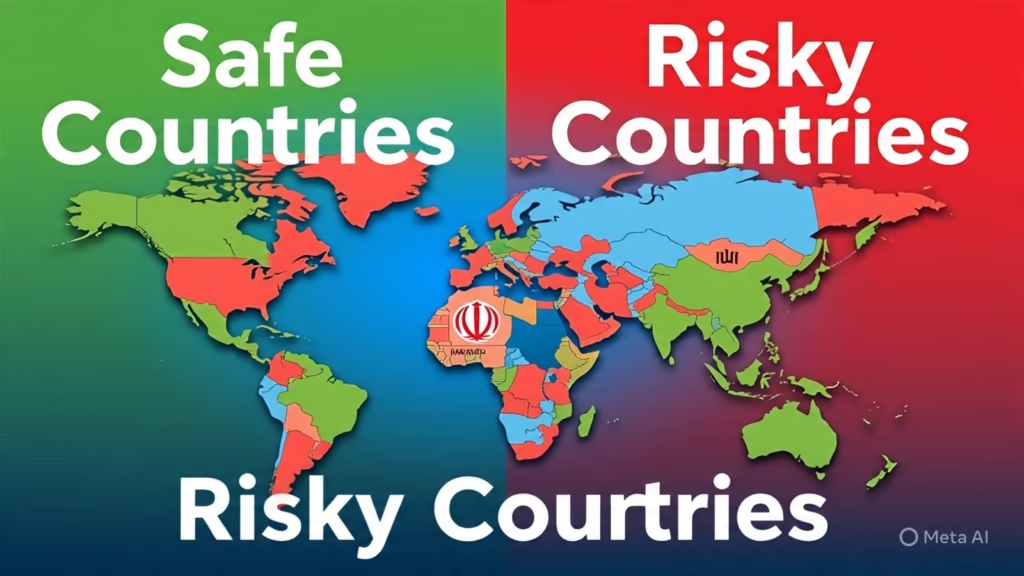Introduction: “Top Reasons to Study Abroad”
In an increasingly globalized world, more students are choosing to pursue higher education outside their home countries. The Top Reasons to Study Abroad go far beyond just academics—they include personal growth, career advancement, language acquisition, and more. If you’re planning your educational journey for 2025 or beyond, this complete guide will help you understand why studying abroad is worth it, how to plan it, where to go, and how much to budget.
1. Global Exposure and Quality Education
One of the Top Reasons to Study Abroad is the exposure to world-class education systems. Countries like the USA, UK, Canada, Australia, Germany, and the Netherlands are known for their academic excellence, cutting-edge research, and innovative teaching methods. Studying abroad gives you access to renowned universities, specialized programs, and professors who are leaders in their fields.
By studying in these countries, students not only gain knowledge but also develop problem-solving, communication, and critical-thinking skills that are highly valued in the global job market.
2. Countries That Are Best for Studying Abroad
Choosing the right country is crucial. Let’s divide this into two categories—best countries and risky countries based on safety, education quality, job opportunities, and visa support.
✅ Best Countries to Study Abroad in 2025
- Canada – Easy PR route, high-quality education, safe and multicultural.
- Germany – Free or low-cost education, especially for engineering and IT.
- Australia – Friendly visa policies, globally ranked universities, part-time work options.
- USA – Home to top-ranked universities like MIT and Stanford.
- UK – Offers 2-year post-study work visa, prestigious institutions.
- Ireland – Rising as a tech hub, safe, English-speaking.
⚠️ Risky or Challenging Countries (2025 Updates)
- Ukraine – Due to ongoing conflict.
- Russia – Political instability and limited job prospects for international students.
- Afghanistan/Iran – Not recommended due to current political scenarios and security issues.
- Some African countries – Infrastructure or academic challenges (varies by nation).
When deciding, balance the Top Reasons to Study Abroad with current political and economic stability, immigration policies, and career opportunities.
3. Visa Consultants: Which One to Trust
A good visa consultant can save time and prevent costly mistakes. But beware of scams. Here are some recommended and trusted abroad study visa consultants:
✅ Top Visa Consulting Companies (2025)
- IDP Education – Official partners with over 700+ universities globally.
- Yocket – Popular in South Asia, especially India and Pakistan.
- AdmitAbroad – Trusted for US and European applications.
- Canam Consultants – Good track record with Canada and UK.
- Edwise International – Offices in multiple countries; wide university network.
⚠️ Tips to Avoid Fake Consultants
- Never pay full fees upfront.
- Always ask for registration numbers.
- Check reviews and testimonials.
- Ensure transparency in offer letters and visa filing.
Choosing a reliable consultant is one of the Top Reasons to Study Abroad successfully without stress.
4. What’s the Budget to Study Abroad in 2025?
Understanding the full budget is crucial before you take the leap. Here’s a breakdown by country, including tuition, living expenses, and other fees:
| Country | Tuition (Annual) | Living Costs (Annual) | Visa + Insurance | Total (Approx) |
|---|---|---|---|---|
| Canada | $13,000 – $20,000 | $10,000 – $12,000 | $300 – $600 | $25,000 – $33,000 |
| UK | $15,000 – $25,000 | $12,000 – $15,000 | $500 – $800 | $30,000 – $40,000 |
| Germany | Free – $1,500 | $9,000 – $11,000 | $150 – $300 | $10,000 – $12,000 |
| USA | $20,000 – $40,000 | $12,000 – $20,000 | $500 – $800 | $35,000 – $60,000 |
| Australia | $18,000 – $30,000 | $12,000 – $14,000 | $400 – $600 | $32,000 – $44,000 |
Scholarships, part-time work, and university assistantships can lower your cost, which is one of the Top Reasons to Study Abroad even with a tight budget.
5. Academic Benefits and Global Career Growth
The Top Reasons to Study Abroad include better career opportunities. Graduates from foreign universities often earn higher salaries and have global job mobility. Studying abroad also improves your resume and showcases adaptability, international experience, and confidence to future employers.
Many programs include internships, research opportunities, or part-time work during studies, preparing students for real-world challenges.
6. When and How to Start Planning?
Start planning 12–18 months before your target intake (e.g., Fall 2026 → Start by April 2025).
Step-by-Step Planning Process:
- Research Programs and Universities
- Take Standardized Tests (IELTS, TOEFL, GRE, etc.)
- Prepare SOP and LORs (Statement of Purpose, Letters of Recommendation)
- Apply to Universities
- Receive Offer Letter
- Secure Funding or Scholarships
- Apply for Student Visa
- Book Accommodation
- Pre-departure Orientation
The organized approach is one of the Top Reasons to Study Abroad successfully without last-minute stress.
7. How to Write a Winning SOP for Studying Abroad
Your SOP is your voice. It’s your chance to show why you deserve a place.
Tips for SOP Writing:
- Start with your academic background.
- Describe your career goals.
- Explain why this country and program.
- Mention how this will impact your future.
- Add Top Reasons to Study Abroad as your core theme.
- Be honest, confident, and professional.
8. How to Succeed While Studying Abroad
Once you’re there, success depends on how you manage time, culture, and academics. Some Top Reasons to Study Abroad students succeed:
- They build international networks.
- They actively participate in university activities.
- They manage their budget well.
- They maintain a healthy study-life balance.
- They seek help when needed—from professors or counselors.
Use platforms like LinkedIn, GitHub, or ResearchGate to showcase your international experience.
9. Accommodation Options Abroad
Where you live affects your experience. Here are your options:
✅ Best Options:
- On-campus dormitories – Safe and close to class.
- University-approved housing – Private but well-regulated.
- Shared apartments – Cost-effective and culturally diverse.
Make sure your accommodation is within a 30-minute commute, has good reviews, and includes WiFi, laundry, and kitchen access. Living comfortably and safely is among the Top Reasons to Study Abroad stress-free.
10. Can Studying Abroad Impact Your Career Positively?
Absolutely. Here’s how:
- Global companies prefer candidates with international exposure.
- You become bilingual or multilingual.
- You gain cross-cultural communication skills.
- You build a diverse portfolio or research background.
All these are Top Reasons to Study Abroad for long-term career growth.
11. Should You Use a Consultant or Apply Yourself?
Consultants help save time and prevent rejection, but applying yourself gives more control. Use free platforms like:
- DAAD.de for Germany
- EducationUSA for US programs
- UCAS for UK applications
Yet, for countries like Canada or Australia, professional guidance can be valuable. A hybrid approach is best—research yourself and get expert help for visa/legal parts. It’s one of the Top Reasons to Study Abroad with confidence.
12. Scholarships and Sponsorships Available in 2025
Many students think abroad study is only for the rich. Not true!
✅ Scholarships to Consider:
- Erasmus Mundus (EU programs)
- DAAD (Germany)
- Chevening Scholarship (UK)
- Fulbright Program (USA)
- Australian Awards
You can also seek sponsorship from:
- NGOs or education trusts
- Corporate CSR programs
- Government study grants (Pakistan’s HEC, India’s ICCR)
Availability of scholarships is among the most important Top Reasons to Study Abroad for financially limited students.
13. How Long Should You Study Abroad?
Most programs are:
- Bachelor’s – 3 to 4 years
- Master’s – 1 to 2 years
- PhD – 3 to 5 years
Short-term exchange programs (3–6 months) are also popular. For a transformative experience, 1–2 years is the sweet spot—long enough to learn, short enough to stay motivated. That’s one of the Top Reasons to Study Abroad with maximum benefit and minimal burnout.
Conclusion: Is Studying Abroad Worth It in 2025?
Absolutely, yes. From world-class education to international career opportunities, the Top Reasons to Study Abroad are stronger than ever in 2025. With the right planning, country choice, financial management, and trusted guidance, you can turn your dream into a life-changing reality.
✅ Quick Summary Checklist
- 🌍 Choose a safe and opportunity-rich country (Canada, Germany, Australia)
- 📝 Prepare SOP, IELTS, and recommendation letters
- 🎓 Apply 12–18 months in advance
- 💰 Budget wisely ($10,000–$40,000/year depending on country)
- 🧳 Seek scholarships or assistantships
- 🛫 Get support from trusted visa consultants
- 🧠 Stay focused and build global networks
FAQs About “Top Reasons to Study Abroad”
1. What should be the main goals for a research stay abroad?
The main goals for a research stay abroad include gaining access to advanced labs, working with global experts, and contributing to international publications. One of the Top Reasons to Study Abroad is the chance to be part of innovative research projects that aren’t available in your home country. It enhances your CV, broadens your academic network, and helps you develop new methodologies. The experience also builds soft skills like communication, adaptability, and collaboration.
2. What should your goals be as an exchange student?
As an exchange student, your goals should focus on cultural immersion, academic excellence, and networking. Among the Top Reasons to Study Abroad is the opportunity to adapt to different education systems while making global friendships. You should aim to enhance your language skills, embrace diverse perspectives, and represent your home institution. It’s also important to manage your time well and explore academic interests outside your usual curriculum.
3. Why should I study abroad? Is it worth it?
Yes, it’s absolutely worth it. The Top Reasons to Study Abroad include access to better education, global exposure, and higher job potential. It pushes you out of your comfort zone and helps you grow both personally and professionally. You’ll experience new cultures, languages, and educational systems, which can shape your worldview. The long-term benefits outweigh the initial challenges, making it a smart investment in your future.
4. What are the academic benefits of studying abroad?
The Top Reasons to Study Abroad academically include exposure to world-class faculty, advanced research facilities, and innovative learning environments. You get the chance to take specialized courses not available in your home country. It improves your academic writing, critical thinking, and practical application of knowledge. Additionally, studying with students from diverse backgrounds can boost your collaborative learning experience.
5. Why should we go abroad for studying? What is the reason?
One of the Top Reasons to Study Abroad is the availability of better opportunities for growth, education, and global citizenship. Studying abroad offers access to quality education, international exposure, and a broader career scope. It encourages independence, cultural exchange, and adaptation. You also get a competitive edge in the job market due to international experience and global skillsets.
6. Will studying abroad affect my academic progress?
Studying abroad enhances, rather than hinders, your academic progress. One of the Top Reasons to Study Abroad is exposure to different teaching styles and assessment methods. You may find that your performance improves due to small class sizes, interactive learning, and hands-on projects. While it may take time to adjust, the academic credits are usually transferable, and your resume becomes more attractive to employers.
7. When should I start planning for studying abroad?
Ideally, you should start planning 12 to 18 months in advance. One of the Top Reasons to Study Abroad is the need for proper preparation—language tests, applications, visa processes, and finances take time. Early planning allows you to explore universities, apply for scholarships, and meet all deadlines without stress. It also ensures you have time to improve your profile if needed.
8. What should I do to succeed studying abroad?
To succeed, stay focused on academics, manage your time well, and immerse yourself in the culture. One of the Top Reasons to Study Abroad is developing independence and self-discipline. Build a support network of friends and faculty, join student clubs, and seek help when needed. Regularly check your academic progress and maintain a balance between social life and studies.
9. How has studying abroad benefited your career?
Studying abroad opened doors to international jobs and improved my adaptability, which are among the Top Reasons to Study Abroad. I gained confidence, fluency in English, and experience working with people from diverse backgrounds. Employers appreciated my international exposure and research experience, giving me a competitive edge in job interviews and internships.
10. What’s the importance of studying abroad?
The Top Reasons to Study Abroad include personal development, global perspective, and professional readiness. It teaches you resilience, problem-solving, and cross-cultural communication. You return with a broader mindset and skills that are applicable worldwide. It also helps build a global network that can be valuable for both career and personal life.
11. What is the best study abroad program to go through?
The best study abroad program depends on your goals, field of study, and budget. Some of the Top Reasons to Study Abroad include joining programs like Erasmus Mundus (Europe), Fulbright (USA), DAAD (Germany), and Chevening (UK), which offer scholarships and strong academic networks. Choose programs that align with your academic interests, offer internships or research opportunities, and have post-study work options. Always check for international rankings and student reviews.
12. What should I say in a study abroad interview?
In a study abroad interview, focus on your academic goals, motivation, and cultural adaptability. Highlight how the opportunity fits into your career plans and mention a few Top Reasons to Study Abroad, like gaining international exposure and accessing high-quality education. Be honest, confident, and show enthusiasm for learning from new experiences. Also, emphasize your readiness to handle the challenges of studying in a new country.
13. I want to study abroad. How can I prepare?
Start by researching universities, preparing for IELTS/TOEFL/GRE, and gathering academic documents. One of the Top Reasons to Study Abroad is the opportunity to build a global career, so align your preparation accordingly. Draft your SOP, request recommendation letters, and begin saving or applying for scholarships. Understand visa requirements and learn basic cultural and language aspects of your target country.
14. Will studying abroad help my career?
Yes, it definitely will. Among the Top Reasons to Study Abroad is the ability to gain international experience, which is highly valued by employers. You become more adaptable, improve your language skills, and get access to better job markets. Many students also land internships or part-time jobs while studying, adding practical experience to their resume before graduation.
15. Is it better to study abroad for better future?
Studying abroad often leads to a brighter future due to the quality of education and global exposure. The Top Reasons to Study Abroad include better employment prospects, access to modern facilities, and the chance to learn in a multicultural environment. You build a global mindset, which is essential in today’s interconnected world. Employers see such candidates as more resourceful and independent.
16. What goals should you have upon entering into a university?
Set goals like maintaining a good GPA, building international networks, and participating in extracurriculars. One of the Top Reasons to Study Abroad is self-growth, so focus on soft skills, time management, and cultural learning too. Strive to secure internships, volunteer, and explore leadership roles. These experiences prepare you for life beyond academics and help maximize your study abroad journey.
17. How to choose between multiple study abroad offers?
Compare factors like tuition, scholarships, course content, university ranking, and location. One of the Top Reasons to Study Abroad is choosing a place that aligns with your long-term goals. Also consider visa rules, part-time work opportunities, post-study visas, and cost of living. Don’t just go for the brand name—look for academic fit and career support.
18. How to start the process to study abroad?
Start by selecting your desired course and destination country. One of the Top Reasons to Study Abroad is accessing unique academic programs not available locally. Research universities, check eligibility, prepare your language scores, and gather required documents. Apply early, track deadlines, and consult a trusted advisor or consultant if needed. Follow a checklist to avoid missing any important steps.
19. What are the steps or requirements to study abroad?
Steps include: choosing a program, meeting academic and language requirements (IELTS/TOEFL), preparing an SOP and LORs, applying to universities, securing admission, getting a visa, and arranging accommodation. One of the Top Reasons to Study Abroad is the structured and globally recognized admission process. Be organized and start early to ensure everything goes smoothly.
20. What is the best study abroad program for higher education?
Programs like Fulbright (USA), Erasmus Mundus (EU), DAAD (Germany), and Rhodes (UK) are some of the best. These offer financial support, international recognition, and quality mentorship, which are some of the Top Reasons to Study Abroad through them. Choose based on your academic discipline and the country’s research or employment potential in that field.
21. Which study abroad program is easiest to get into?
Programs in countries like Germany (public universities), Italy, and France often have less competitive admission processes for public-funded degrees. One of the Top Reasons to Study Abroad in these countries is their affordability and open access to international students. Many of them only require basic language proficiency (like IELTS 6.0) and a decent GPA. Always apply to multiple options to increase your chances.
22. Which country gives student visa easily?
Countries like Canada, Germany, Ireland, and the UK have streamlined and transparent student visa processes. Among the Top Reasons to Study Abroad in these destinations is the supportive visa system for international students. Canada and Germany, in particular, offer high visa approval rates if documents are complete. However, strong financial proof and a clear Statement of Purpose (SOP) are still essential.
23. How to get a student visa without agent?
You can apply online directly through official embassy or consulate websites. One of the Top Reasons to Study Abroad is the accessibility of direct application systems that make agents optional. Prepare your documents: admission letter, passport, financial proof, SOP, and pay the visa fee. Follow the checklist provided by the embassy and schedule your interview confidently.
24. How much bank balance is required for student visa?
It varies by country. For example, Canada requires around CAD 20,635/year (2025), UK needs about £13,000/year outside London, and Germany asks for about €11,208/year in a blocked account. A key among the Top Reasons to Study Abroad is financial planning—your visa depends on it. Ensure your bank statements are recent and officially stamped or certified.
25. Which consultancy is best for study abroad from Pakistan?
Top consultants include HR Consultants, EdFolio, Times Consultant, and IDP Pakistan. One of the Top Reasons to Study Abroad using a consultancy is guidance with admissions, visa prep, and choosing the right program. However, research reviews and success stories before committing. Good consultancies are transparent about fees and don’t promise “guaranteed” visas.
26. Can I study abroad with low marks?
Yes, many universities accept students with 2nd division or lower GPAs, especially in countries like Turkey, Malaysia, Italy, and even some European countries. One of the Top Reasons to Study Abroad is that foreign universities assess the whole profile—SOPs, work experience, and language tests matter too. Consider foundation or pathway programs as a backup.
27. What is the cheapest country to study abroad?
Germany is the cheapest for tuition (almost free), and countries like Norway, Poland, Hungary, and Malaysia also offer low-cost education. A major point in the Top Reasons to Study Abroad list is affordability, and these countries top that chart. Just budget for living expenses (Germany: €900/month approx). Scholarships are often available for international students.
28. How much total budget is required to study abroad?
It depends on the country, program, and lifestyle.
- Canada/UK/USA: $20,000–$35,000/year
- Germany/Italy/Poland: $8,000–$15,000/year
The Top Reasons to Study Abroad include long-term ROI, so it’s often worth the cost. Your major expenses include tuition, visa, health insurance, flights, and monthly rent. Apply for scholarships and work part-time to reduce your expenses.
29. Which countries are safe to study abroad?
Canada, Australia, Germany, Sweden, and Japan are considered safest for international students. One of the Top Reasons to Study Abroad in these countries is their student-friendly environments, low crime rates, and supportive legal systems. They also have strong international student support networks and policies to prevent discrimination.
30. Which countries are risky to study abroad?
Countries with political instability, visa fraud issues, or poor human rights ratings can be risky. These may include places with ongoing conflict or harsh local laws (e.g., parts of the Middle East or Africa). One of the Top Reasons to Study Abroad is safety, so always check travel advisories and student reviews. Prioritize countries with structured academic systems and strong legal protections for students.
31. Can I get PR after studying abroad?
Yes, many countries like Canada, Australia, and Germany offer pathways to Permanent Residency (PR) after graduation. Among the Top Reasons to Study Abroad is the chance to build a life post-study through work permits and PR options. You’ll typically need to work for 1–2 years in your field, meet language and income requirements, and apply under post-study immigration streams.
32. What are post-study work options abroad?
Countries like Canada (PGWP), UK (Graduate Route), and Australia (Temporary Graduate Visa) allow you to work 1–3 years after studies. One of the Top Reasons to Study Abroad is gaining international work experience after your degree. This work period can help you apply for PR, pay off loans, or get job sponsorships.
33. Can I bring my spouse or family on student visa?
Yes, many countries like Canada, Australia, and the UK allow spouse and child visas with student permits. A major point in the Top Reasons to Study Abroad is the ability to keep your family close. Spouses often get work rights too. However, you must show financial capability and secure housing in advance.
34. Is IELTS mandatory for study abroad?
In most English-speaking countries like Canada, UK, and Australia, IELTS or similar tests (TOEFL, PTE) are required. But some universities waive it if your previous education was in English. One of the Top Reasons to Study Abroad is flexible admission policies—many countries now accept a wide range of English tests or even Duolingo English Test.
35. What to write in SOP (Statement of Purpose)?
Your SOP should explain your academic background, career goals, why you chose the program, and why that specific country/university. One of the Top Reasons to Study Abroad is the ability to pursue focused academic goals—and your SOP must reflect that. Be genuine, concise, and connect your plans with what the university offers.
36. How to prepare documents for study abroad?
Start by collecting your passport, transcripts, degree certificates, language test results, SOP, CV, reference letters, and financial proof. Among the Top Reasons to Study Abroad is learning professional organization—and visa success relies heavily on complete documentation. Scan, notarize (if needed), and organize all files in digital and physical format.
37. Is it better to apply through agent or directly?
If you’re confident in research and document handling, apply directly—it saves fees. However, for complicated cases, agents can help. One of the Top Reasons to Study Abroad is the simplicity of the process when you prepare well. Always choose licensed consultants if you go through an agent and avoid scams.
38. Which scholarships are available for Pakistani students?
Top ones include HEC Overseas Scholarships, DAAD (Germany), Erasmus+ (Europe), Chevening (UK), Fulbright (USA), and MEXT (Japan). A key among the Top Reasons to Study Abroad is scholarship availability for high-achieving students from Pakistan. These scholarships cover tuition, living, and even travel expenses. Apply early and meet deadlines.
39. How to choose the best university abroad?
Check world rankings, course content, faculty, location, job prospects, and affordability. One of the Top Reasons to Study Abroad is accessing world-class education—so choose a university that aligns with your career goals. Also look at student satisfaction scores and graduate employment rates. Use platforms like QS or Times Higher Ed.
40. Can I change my course or university after going abroad?
Yes, in many countries you can switch programs or institutions with approval from immigration authorities. Among the Top Reasons to Study Abroad is academic flexibility—you’re not locked into one path. Just ensure the new course aligns with your visa and doesn’t affect your study duration or graduation timeline.






